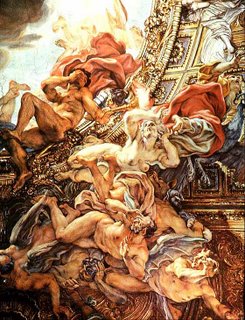Day 22 – Blindness
Day 23 – Lagtime
Day 24 – Weakness
Day 25 – Death
Day 26 – Our Choices
Day 27 – Truth
Day 28 – The Way to True Unity
From The Loyola Kids' Book of Saints by Amy Welborn
How do you teach a classroom that's as big as a whole country? How do you teach a whole country about God?St. Patrick's classroom was the whole country of Ireland and his lesson was the good news of Jesus Christ. How in the world did he do it? Well, it was only possible because he depended totally on God.....God gave Patrick the courage to speak, even when Patrick was in danger of being hurt by pagan priests who didn't want to lose their power over the people.Patrick's most famous prayer shows us how close he was to God. It's called “St. Patrick's Breastplate.” A breastplate is the piece of armor that protects a soldier's heart from harm.Christ with me, Christ before me,
Christ behind me, Christ within me,
Christ beneath me, Christ above me,
Christ at my right, Christ at my left.
The Cross of Christ Transforms. . . Law and Love

Jesus said to Nicodemus:“Just as Moses lifted up the serpent in the desert, so must the Son of Man be lifted up, so that everyone who believes in him may have
eternal life.”For God so loved the world that he gave his only Son, so that everyone who believes in him might not perish but might have eternal life.For
God did not send his Son into the world to condemn the world, but that the world might be saved through him.Whoever believes in him will not be condemned, but whoever does not believe has already been condemned, because he has not believed
in the name of the only Son of God.And this is the verdict,that the light came into the world, but people preferred darkness to light,because their works were
evil.For everyone who does wicked things hates the lightand does not come toward the light, so that his works might not be exposed.But whoever lives the truth comes to the light, so that his works may be clearly seen as done in God.
You can get John Paul II's Biblical Way of the Cross by Michael Dubruiel and Amy Welborn here.
In 1991, Pope John Paul II introduced a new Bible-based interpretation of the Stations of the Cross. This devotional guide invites readers to prayerfully walk in solidarity with Jesus on his agonizing way of the cross—from his last torturous moments in the Garden of Gethsemane to his death and burial.
Now with full-color station images from previously unpublished paintings by Michael O'Brien, this booklet creates an ideal resource for individual or group devotional use, particularly during the Lenten season.